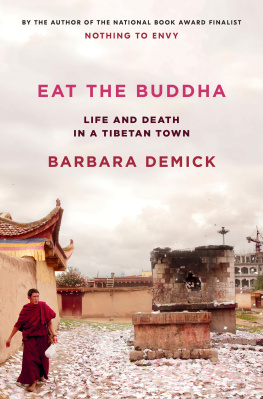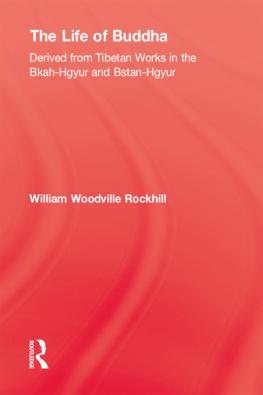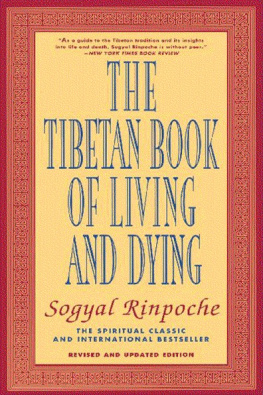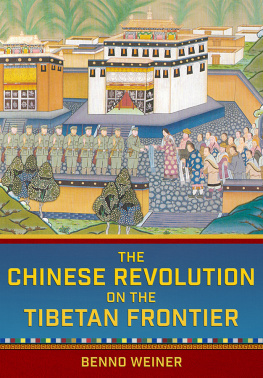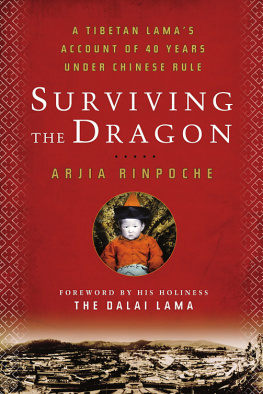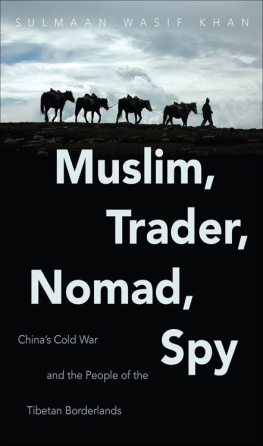ACKNOWLEDGMENTS
T HIS BOOK IS DEDICATED TO Lobsang Chokta Trotsik. We met in 2014 thanks to an introduction from the poet Tsering Woeser. Trotsik, as I knew him (he took his nickname from his village in Ngaba) was the vice president of Tibetan Writers Abroad PEN, a writer, and a voracious reader. He immediately understood my fascination with Ngaba and my approach to telling its story through the lives of ordinary Tibetans. He introduced me and vouched for me to many other people from Ngaba whose stories form the backbone of this book. On February 12, 2015, Trotsik was stabbed to death at a bus station in New Delhi, a senseless murder I am still struggling to understand. His death at the age of thirty-three was an incalculable loss to his family, his community, and really anybody who cares about the future of the Tibetan culture and language. He had been working to improve digital access to Tibetan literature and was passionate about the need to spread awareness beyond the subject of Buddhism. I can only imagine how much was lost with his premature death.
Matthew Akester provided invaluable guidance on this project at every step of the way. When I was still trying to decide which Tibetan community to profile, I stumbled on the blog he wrote with Jianglin Li. I consulted with him frequently during the writing, editing, and fact-checking process. Akester is also responsible for the evocative phrase Eat the Buddha!, a title he gave to the study he and Li co-authored about the Red Armys sweep through Ngaba during the 1930s. Jianglin Li has plowed so much new ground in her research about the Red Armys misadventures in Tibet from the 1930s through the 1950s, and she was generous in sharing with me some of the Chinese documents and sources she uncovered.
I met Tsering Woeser during that eventful year of 2008 and we attended the exhibit Tibet: Past and Present at the Cultural Palace of Nationalities in Beijing. It was hard to see her subsequently because she was often under surveillance, but her guidance was invaluable, as was her blog, probably the best day-to-day source of whats happening in Tibet. I also want to thank Dechen Pemba and the staff of High Peaks Pure Earth, a website that translates and curates writing in Tibetan and about Tibet, including the work of Woeser.
In India, the Tibetans featured in this book sat patiently through extended interviews over repeated cups of ginger lemon tea. Amdo Delek shared with me decades of research; Gonpo Tso Mevotsang relived painful memories to allow me to tell her story, and her daughter, Wangzin Lhamo, and other members of the family helped me gather mementos and photos. I interviewed dozens of people from Ngaba who, while not all subjects of this book, filled in many details. Kunchok Gyatso, also known as Kungam, who ran an association of former political prisoners in exile, was especially helpful. Tashi Phuntsok and Tsering Wangchuk of the exile governments Department of Information and International Relations helped me navigate the exile bureaucracy. Penpa Tsering, who had been speaker of the Tibetan parliament in exile, helped convince the initially reluctant Gonpo to speak with me. Kirti Rinpoche, abbot of the monastery, was generous with his time and facilitated other interviews at Kirti. Kanyag Tsering and Lobsang Yeshi run a small but well-equipped information office at Kirti Monastery in Dharamsala that provided photographs and documents, including the test papers given during the patriotic education sessions. Among the many human rights activists who were helpful were Kate Saunders, formerly of the International Campaign for Tibet, Bobbi Nassar, and Kerry Wright. I frequently consulted reports from the ICT, as well as Human Rights Watch, Amnesty International, and the Tibetan Centre for Human Rights and Democracy. Radio Free Asia often reported first on breaking news out of Ngaba.
Nobody has done more to inform a generation of journalists about Tibet than Robbie Barnett. Somehow he manages to simplify without being simplistic, to be simultaneously eloquent and plainspoken. His insights can be found throughout this book, as should be evident from the many references and endnotes.
Early readers of the manuscript were my uncle, David Schmerler, who also served as cameraman during an interview with the Dalai Lama; and my friend Julie Talen, a screenwriter and filmmaker with an unfailing sense of story. I talked through my ideas regularly with Margaret Scott.
My original reporting on Tibet was done for the Los Angeles Times. Photographer Carolyn Cole accompanied me on trips to Ngaba, Dharamsala, and Nepal; besides taking stunning photos, she proved an equal partner at reporting. My colleagues at the Beijing bureau Jia Han, Jon Kaiman, Nicole Liu, Mark Magnier, Julie Makinen, Ching-Ching Ni, David Pierson, and Megan Stack all played a part. Tommy Yang uncovered much of the original research that went into this book and helped with fact-checking all the way to the end. I thank former foreign editor Marjorie Miller for sending me to Beijing, and her successors Mark Porubcansky, Kim Murphy, and Mitchell Landsberg for shaping my reporting into coherent stories and giving me a long enough leash to satisfy my obsession with this place. Editors Norman Pearlstine and Scott Kraft gave the most valuable gift of allfreedomin allowing me an extended leave of absence.
Over seven years living in Beijing, I was educated by the never-ending conversation about Chinas past and future that took place in our homes, restaurants, and coffee shops. Many of my colleagues in Beijing also covered Tibet issues and gave their advice and insight freely. Evan Osnos wrote a profile of the Dalai Lama for The New Yorker, which is quoted in this book; and Ed Wong of The New York Times irritatingly scooped me often on stories about Tibet, but remains a good friend. Andrew Jacobs wrote one of the funniest pieces Ive ever read about Tibet. Hannah Beech, Ed Gargan, and Jane McCartney were all obsessed with Tibet long before me, as was Tim Johnson, who also authored a book on the subject. Barely a few days went by when I didnt consult with Gady Epstein about my work. Jonathan Watts, Holly Williams, and Tom Lasseter all traveled before me to Ngaba. Other fellow travelers in Beijing who shared ideas, meals, reading recommendations, and companionship were Jonathan Ansfield, Tina Beeck, Angus Cargill, Lillian Chou, Sheila Fay, Claudio Garon, Jen Lin-Liu, Melinda Liu, Jane Perlez, Keith Richburg, Didi Tatlow, Greg Thurman, and Lijia Zhang. Madeleine Grant traveled with me in Amdo. Back in the United States, colleagues and fellow writers offered guidance: Anna Boorstin, Molly Fowler, Robin Golden, Lee Hockstader, Terri Jentz, Ruth Marcus, Nomi Morris, Lena Sun, Margaret Scott, Burton Wides, and Laura Wides-Muoz. Eden Mullon, Nicholas Demick, and as always my mother, Gladys Demick, were a source of support throughout.
I am in awe of the wealth of research done by the academic community about Tibet, especially in light of the obstacles placed by the Chinese government. I repeatedly consulted the work of many scholars: the late Elliot Sperling; historian Tsering Shakya, whose work is cited repeatedly in this book; Andrew Fisher on the Tibetan economy; Gray Tuttles writings about Amdo; and Max Oidtmann, who explained to me the subtleties of the Qing dynastys relationship with the Tibetans. Among the China scholars: Orville Schell, whose books about both China and Tibet educated throughout.
Flip Brophy, my agent and friend, has been with me every step of the way, ably assisted in recent years by Nell Pierce. Nobody helped to shape this book as much as Julie Grau, who transformed me from a daily newspaper writer into an author. Thanks as well to Cindy Spiegel and Mengfei Chen of Spiegel & Grau. I didnt think anybody could compensate for their loss, but Andy Ward earned my respect and gratitude, as did Marie Pantojan. Bella Lacey of Granta Books offered invaluable advice throughout.

